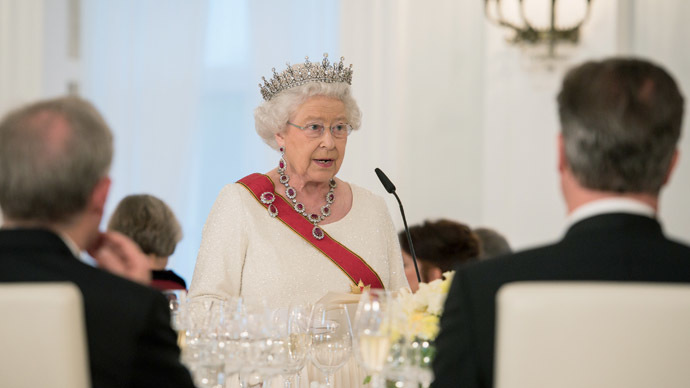Royal warning: Queen cautions Europe over ‘divided continent’ in rare intervention

Queen Elizabeth II made seemingly pro-EU comments when she cautioned British and German politicians over the ‘dangers of division’ at a state banquet in Berlin. Buckingham Palace has denied the statement was political.
The British monarch espoused the benefits of cooperation between European nations as she remembered the “worst” events of the continent’s history during her speech on Wednesday night.
Her comments have been interpreted as endorsing the UK’s membership of the EU. However, Palace officials denied that the Queen was expressing a political stance.
The Queen’s unusual intervention into European politics coincided with the publication of a report suggesting a British exit from the EU could take a decade to negotiate and be fraught with economics risk.
The monarch was hosted by 75-year-old German President Joachim Gauck, who was once an anti-communist civil rights activist in East Germany.
From the UK, Prime Minister David Cameron and the Euroskeptic Foreign Minister Philip Hammond were in attendance at the banquet.
""We know that division in Europe is dangerous" Queen Elizabeth II in Germany. EU is demonstrating dangers of enforced non-democratic union!
— Martin Cole (@IroniesToo) June 25, 2015
Speaking directly to Gauck, the Queen said: “In our lives, Mr. President, we have seen the worst, but also the best of our continent. We have witnessed how quickly things can change for the better. But we know that we must work hard to maintain the benefits of the post-war world.
“We know that division in Europe is dangerous and that we must guard against it in the west as well as in the east of our continent.”
In a show of agreement, German Chancellor Angela Merkel is reported to have nodded vigorously during the Queen’s speech.
Several media outlets have interpreted the Queen’s speech as hinting at a desire for Britain to remain in the EU.
A Buckingham Palace spokesperson has denied this, saying, “The queen’s speech speaks for itself on the threats of division and the benefits of unity. As ever, the queen is above politics and is politically neutral on the EU.”
READ MORE: Sturgeon denies Scotland will cut Queen’s subsidy, rebuffs Palace claims
During her short speech, Queen Elizabeth referenced important events in European history, tracing the “long, slow” development of democracy from the Magna Carta in Britain to Germany’s first freely elected legislature in Frankfurt in 1848.
The monarch’s comments in Berlin follow a carefully scripted intervention in British politics in the run up to the Scottish independence referendum, in which she asked voters to “think very carefully.”
Gauck emphasized the importance of Britain’s role in building democracy in Germany after the war, expressing his country’s enduring gratitude.
“A quarter of a century after the division of our continent ended, the European Union is facing major challenges,” the German president said.
“We know that we need an effective European Union based on a stable foundation of shared values. A constructive dialogue on the reforms Britain wants to see is therefore essential.”
Germany supports such dialogue, he said.
READ MORE: ‘Hatred and lies’: European Parliament president slams ‘toxic’ UK debate on Europe
“For Britain is a part of Europe. The European Union needs Britain.”
The banquet in Bellevue Castle coincided with the publication of a report by consultancy firm Global Counsel suggesting it could take Britain a decade to negotiate an EU exit.
Research by former UK Foreign Office chief economist Gregor Irwin indicates a ‘Brexit’ would damage business in the UK and further afield, impacting on the Netherlands, Ireland and Cyprus particularly hard.
Irwin’s report concludes a Brexit would damage Britain’s regulatory influence, dampen the attractiveness of the City of London, deter inward investment and hobble business activity through protracted uncertainty.
The UK stands to lose the most from Brexit in economic terms, he added.
“If the UK leaves we will face years of uncertainty and acrimonious negotiation over Britain’s future relationship with Europe. The effects will be most profound in the UK, but felt by businesses and households everywhere in the EU,” Irwin wrote.
“It would impact in Brussels as Brexit would destabilize relationships between the large member states and shift the balance of influence towards more intervention in the European economy.”
“Brexit would change Europe not just Britain’s position in Europe,” he added.












